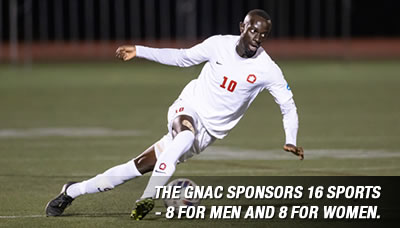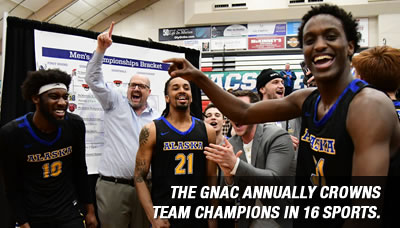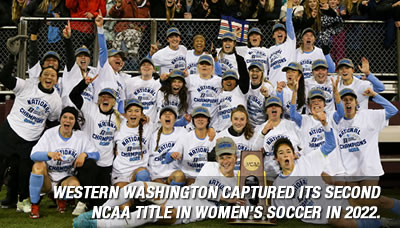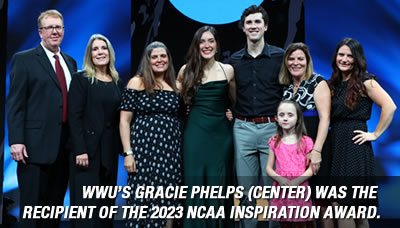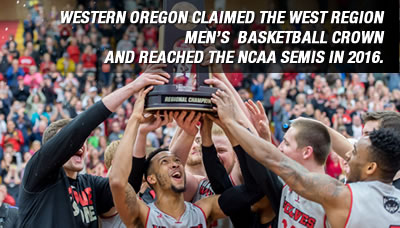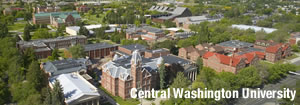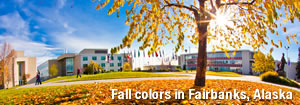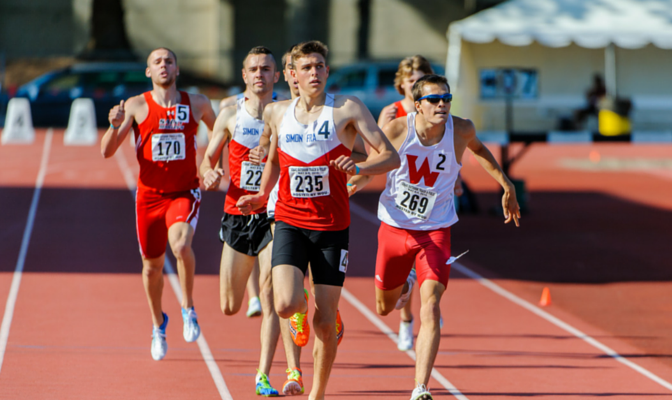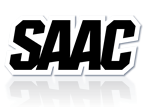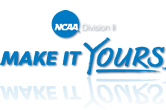Monday, July 13, 2015
Part of a regular series.
Throughout the year, GNACsports.com uses this space to profile conference student-athletes who are members of their respective institutions' Student-Athlete Advisory Committee (SAAC). In addition to providing feedback on the student-athlete experience, conference and institutional SAAC members also offer input on the rules, regulations and policies that affect student-athletes' lives on NCAA member institution campuses. Click here for more information on the function of SAAC at the NCAA level.
Cameron Proceviat
Simon Fraser University
Track & Field/Cross Country
Hometown: Burnaby, B.C.
College major: Molecular biology and bio-chemistry
Year in school: Fourth
Extracurricular activities: I play other sports, like basketball, street hockey and tennis with friends. I volunteer as a track and field coach to Special Olympics athletes and elementary school children.
Why did you choose to attend SFU? I wanted to attend a school that was near home. My two options were either the University of British Columbia or SFU. It was a hard decision, but I ended up deciding on SFU because I liked how much more flexible it would be for me, being someone who had no idea what they wanted to major in. I luckily was given the opportunity to come onto the track team as a walk-on and so far have really enjoyed my time at SFU being a student-athlete in the NCAA.
What is your favorite class you have taken in college and why? An MBB (molecular biology and biochemistry) class called Intermediary Metabolism. Although it involved a LOT of memorization (pathways like glycolysis, citric acid cycle), the professor was able show us the significance of every part of the pathway and how it works to provide energy to living organisms. I found it really interesting to see how all of the items on the nutritional information charts of food labels (i.e., protein, carb, fats, vitamins) play a part in keeping you alive, and what happens if you do not provide your body with these. Another topic in this class was about how the body deals with many different drugs, and how these drugs have an effect at the molecular level.
Who is your favorite professor you've had in college and what did you enjoy about learning from him or her? It’s tough to narrow down, because I have had a lot of them. I enjoy professors that try to teach you the significance of all the material, and how you can apply it rather than just giving out information. A lot of the professors I have had within my major have provided this kind of teaching method, which is kind of why I decided to major in molecular biology in the first place.
Years involved in SAAC: 2.5
The reason I chose to get involved in SAAC: I saw a teammate of mine wearing a SAAC T-shirt, and thought it would be nice to have one of them. In high school, I was a part of some student organizations as well, and this T-shirt made me wonder what SAAC was.
Most memorable SAAC activity: My first Clan Olympics, which is an event that SAAC hosts every year. People from all the different teams are sorted into teams, and we play games like dodgeball, kickball and have relays. It was the first SAAC event I ever went to, and I ended up meeting a bunch of athletes from different teams.
If I could change one NCAA rule, it would be: The lack of payment to athletes that make money for the NCAA and their universities in DI football and basketball.
What is the most important thing you've learned from balancing the demands of athletics and academics? If you are going to be successful at anything, you've got to be happy with what you are doing. When I am stressed out with schoolwork I am not happy, so even if it means less time studying, I sometimes have to make myself do something I enjoy before enjoying my schoolwork again. I've found that doing track and field complements really well with school work, as I love training, and many times it functions as my fun when I need a break from school. When I am happy and having a good time, success follows in both academics and athletics.
What does it mean to be a Division II student-athlete? To me it means balance between all areas of life. As a Division II student-athlete, I can focus on succeeding in my education, sport and other areas of my life that need attention for me to be happy. If I had to focus all my energy on one component of my life, I would become bored and unmotivated. Also to try my best to beat the track times of as many DI athletes as possible.
Future goals after school: At the moment, I haven't really made a firm decision. When I graduate from SFU, I want to see where I am at with athletics, and see if it is worth it to continue. I know that when I stop running, I won`t be able to continue again at a competitive level, so I want to leave the sport with no regrets. After running (whether it be after university or later in life) I want to either go to medical school somewhere in Canada, or do some sort of science research to somehow help humanity after getting more education.
Biggest obstacle overcame during my collegiate career: It would probably have to be my first year at the university. I did not really take running seriously in high school, and was lucky to be on the SFU team. I red-shirted my full first year and spent a LOT of time on my own doing the training. Nowadays, I find it harder to find motivation to train when I am on my own, yet I spent a huge amount of time in my first year by myself, as I was doing different (easier) workouts and was not traveling. Only now do I realize how hard I was working while somehow managing to adjust to post-secondary education and training harder than I ever had in the past. I somehow did well in school and improved in running more than I thought was possible.
Best advice I’d give to an incoming freshman: You have to realize your limits. University academics and sports are a lot more difficult to manage than in high school. You need to accept mistakes and move on, and expect to keep making mistakes and learning new lessons throughout your whole university career. With this, expect a progression in your athletics, just like how you continually learn more about your field of study. Getting better at your sport (especially running) is a long process and can`t be rushed.
If I could spend the day with one person (past or present), who would it be (and why)? My track coach at SFU. She always makes me feel like I’m on the right path with life, has tons of interesting stories and advice to give, and she is an Olympian, so she knows what it takes to succeed.
Favorite athlete: I’ve got a poster of him in my bedroom -- David Rudisha, the world record holder in the 800 meters. He just seems so modest and hard working. Last year he came back from a bad injury, was not at his top form, and still decided that he would compete as if nothing happened to him. He didn`t complain about his issues, but just spoke of how he wanted to improve from them. He gives a valuable outlook on running that most athletes should follow.
One thing that people don't know about me is: A couple buddies and I who grew up together on the same street had a phase one summer (when we were maybe around 12 years old) where we watched the movie Mean Girls at least 3 times a week. I still have no idea why we decided to watch it so many times, but the result is that I can pretty much quote any scene in the movie. I`ve done my best to hide this talent, but sometimes I can`t help bust out a couple lines ... which follows with my face going red in embarrassment.

